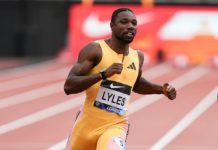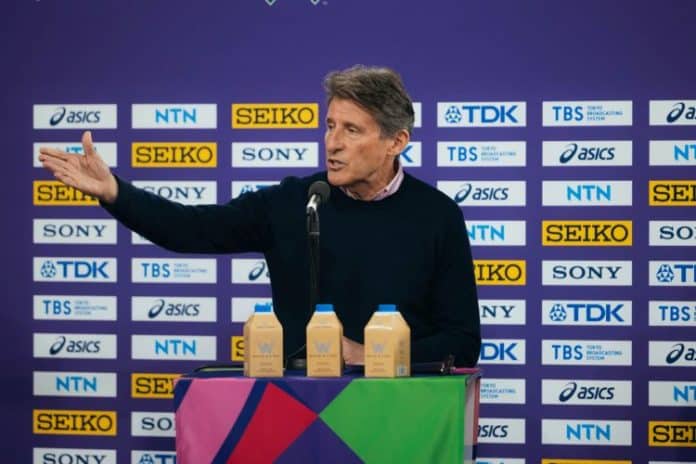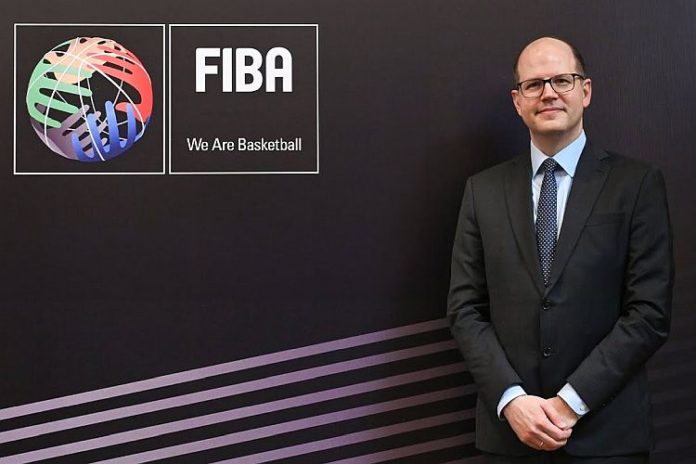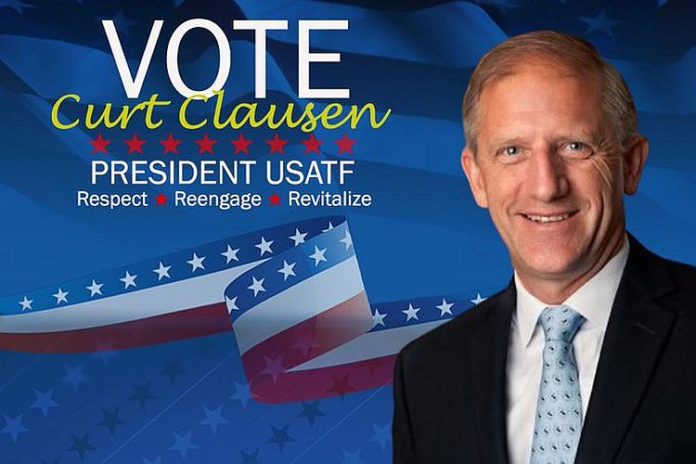★ The Sports Examiner: Chronicling the key competitive, economic and political forces shaping elite sport and the Olympic Movement.★
★ To get the daily Sports Examiner Recap by e-mail: sign up here! ★
≡ IOC PRESIDENTIAL ELECTION ≡
It’s not difficult to get British Olympic star and World Athletics President Sebastian Coe talking when you mention the future of not just athletics, but the International Olympic Committee and the Olympic Movement, as he is running to be the next President of the IOC.
The election is not until next March, and Coe and the other six candidates will speak to the IOC membership on 30 January 2025 in a closed session in Lausanne. But Coe, especially, has been open to interviews and spoke to TSX on Monday; this part two of our report.
Coe spoke with enthusiasm about the possibilities in front of the Olympic Movement, especially with the expanding number of countries which are beginning to see success at the international level. Referring to his own sport of track & field:
● “You know, we have powerhouses of the sport like the U.S. and China and the U.K. But you also have dots on the map. And so, if you get it right, and you really target and leverage your development funds and make sure with accountability and transparency, they land where they’re supposed to. Hey, you might just end up with a few more St. Lucias,” referring to sprint star Julien Alfred, the women’s Olympic 100 m champion in Paris and the 200 m silver medalist, who won her country’s first-ever Olympic medals.
● He also pointed to other first-time medal winners in the Paris athletics program, such as Dominica and Pakistan: “I’m in a sport where 43 countries won Olympic medals. So it’s not, you know, this isn’t about the many and the few. We have that responsibility and the only way you’re going to do that is to absolutely harvest the experiences and the skills of the people that can make that happen.”
Coe then took that concept beyond track & field to the whole Olympic Movement:
“And that’s not just limited to the membership of the International Olympic Committee. That is working in tandem with National Olympic Committees, whatever size they are, and within their own organizations. It’s working with international federations. That’s about organizations like ASOIF [Association of Summer Olympic International Federations] and ANOC [Association of National Olympic Committees].”
And he carried his empowerment theme further:
“It’s working with our partners. Look, our partners are world-class businesses. They have a habit of employing world-class people. They should be sitting at the table helping us structure these things. We’ve got broadcasters, who themselves are grappling with what the next broadcast iteration looks like.
“So when I say enabling, I mean just utilizing and harnessing the people that we’ve got. To help us move along at roughly the same pace and to recognize that – we know this in World Athletics – there is no one-size-fits-all here. You have to have flexibility.
“And if you have flexibility and you do it in a way that is respectful of tradition and philosophy – which you can, you can do that – then you actually have an opportunity to grow. Grow the footprint. But that’s not done by just one small element of the landscape. There are interdependencies here which have to be recognized, and we have to make the most of them. We all are in that same landscape where there are no unique problems here.”
Coe then tackled the question of how the IOC and the Olympic Movement can grow, when it essentially has only two real “products” in the Olympic Games and the Winter Games – two years apart – with the Olympic Esports Games coming up possibly in 2025. Here, he wants to find a new pathway in worldwide sport, not only for athletes, but also for fans:
“What I think we have got to do better and it will actually serve the Movement well and particularly the Olympic Games, is there’s got to be some connectedness between the events that we are putting on.
“And the big global moments at the Olympic Games clearly offers winter and summer sports. But at the moment it sort of feels that there is not enough connectedness around those sports … so, revisiting the global calendar is going to be critical. …
“The Games have really got to harness the journey that the athletes, the competitors make through their sports to the Games. And I sense there’s not enough continuity. And the journey that the athletes make to an Olympic Games shouldn’t be the bes- kept secret.
“When they get to a Games and suddenly people are sitting there going, ‘Oh my goodness, I really didn’t know that we had so and so that was likely to win a triathlon. Who the hell, you know, do we?’ Too many surprises here.
“And so building the profile of the athletes, through our world sporting programs, through our international federations is huge. And actually we should all be on a rising tide here. And that’s why I say that there are interdependencies. We’re not competitors here. We actually have to be collaborators.”
That will be a welcome approach to the International Federations, especially, who hear constantly about the increases by the IOC to the Olympic Solidarity budget – now to $650 million for 2025-28 – but not much about more money for their developmental programs.
¶
The seven-candidate field for the IOC Presidency is a little odd in that it includes four presidents of International Federations: Coe from World Athletics, David Lappartient (FRA) from the Union Cycliste Internationale, Johan Eliasch (GBR) from the International Ski and Snowboard Federation and Morinari Watanabe (JPN) from the Federation Internationale de Gymnastique. Only one of the nine IOC Presidents in history has come from an International Federation, the Swede J. Sigfrid Edstrom, who was the head of the IAAF (athletics) and then IOC chief from 1942-52.
Further, multiple candidates – including Coe – face age issues from the Olympic Charter rules that end IOC membership at age 70, although a four-year extension is allowed if approved by the members.
In Coe’s case, his election as IOC President would require a conversion of his membership from World Athletics President to an individual IOC member and then, in 2026, a four-year extension to 2030, which would still be short of the end of an eight-year first term in 2033. So, the Olympic Charter would need to be amended to allow him to serve beyond 2030.
Coe is not overly concerned. To him, this is simply about democracy:
“It’s it’s up to the members. It’s a member decision. What do I know? I know that I was deemed eligible to stand.
“Nobody sat there saying to me that you were anything other than eligible to stand. So you know that’s for the membership to decide. And I will stand by that judgement. All I can say is that if given the opportunity, I will work tirelessly. And it’s the membership that have the ability to do that. Done it in the past.
“Statuses get changed very regularly in the Movement. I sit through [IOC] Sessions and congresses where routinely statuses get altered. And the membership approve. It’s an interesting one, isn’t it? Maybe it’s comes back to some of my feelings about enabling. It’s for the members to decide.
“And if I’m prepared to put myself forward for this. I’m clearly prepared to be judged. … But I don’t sit here thinking that this is a job for life. It’s it’s within the gift of the members and that’s the way it has to be.”
Coe confirmed that, if elected, he will move to Lausanne and work from Olympic House as IOC Presidents beginning with Spain’s Juan Antonio Samaranch (ESP) have done since 1980:
“That’s where the job is; you know that’s where you need to be.”
Observed: Coe is an experienced and sophisticated candidate, who has enormous experience in the athletic, business, organizational and political aspects of worldwide sport. As he notes, he has excellent access and knowledge of worldwide sports leaders and some of the political leaders he will need to deal with.
Can he convince the IOC membership he’s the right one to lead them into the future? He has detractors, especially over World Athletics’ payment of Paris 2024 prize money, and there will be concerns over his age and the rule changes that will be needed to accommodate his presidency at least to the end of a first term in 2033.
But in this interview, he brought a powerful message that the IOC membership can be much empowered to contribute directly to the expansion and improvement of worldwide sport. There are many IOC members who don’t have that much asked of them as members now, especially since they do not visit candidate cities or vote in contested host-city elections for the Olympic and Winter Games any more.
The appeal of being more of a player in the Olympic Movement could be an interesting lure, and Coe can point to developing and managing governance successes in the massive clean-up he undertook of World Athletics in the face of the scandals left by predecessor (and former IOC member) Lamine Diack of Senegal (now deceased), who was also accused of buying IOC votes in host-city elections. And now, athletics is seeing significant increased investment in the sport in the U.S. for the first time in decades, and a major new event is being introduced in the “off-year” of 2026 between World Athletics Championships by his federation.
As he was on the track, in the successful bid for the 2012 Olympic Games, and as the Chair of the London 2012 organizing committee, Coe will be a formidable candidate. But, of course, not the only one.
¶
★ Receive our exclusive, weekday TSX Recap by e-mail by clicking here.
★ Sign up a friend to receive the TSX Recap by clicking here.
★ Please consider a donation here to keep this site going.
For our updated, 885-event International Sports Calendar for the rest of 2024, 2025 and beyond, by date and by sport, click here!




























